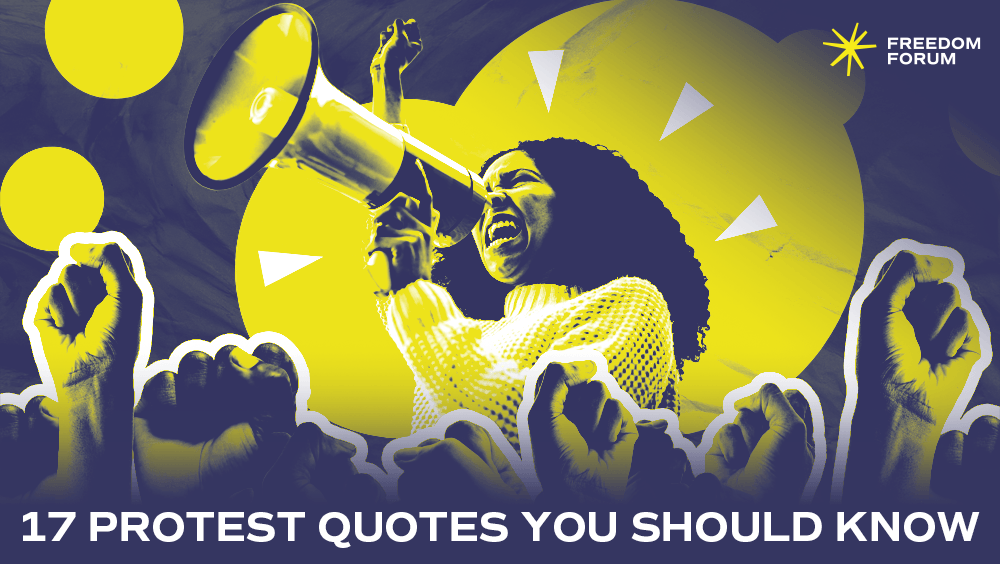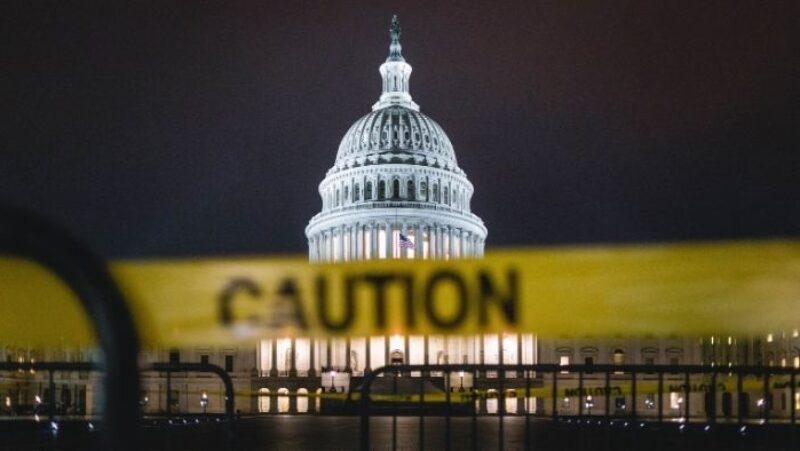17 Protest Quotes You Should Know

The word “protest” does not appear in the First Amendment, but the vital freedoms that the First Amendment protects enable people to gather to march, rally and protest for change. When people who protest unite their voices to speak out together to support or oppose an idea, they are exercising the freedoms of speech, assembly and petition.
To celebrate how protest is a core part of the United States’ history and identity, we gathered 17 quotes about protest.
Discover 17 protest quotes from throughout history
1. “A patriot must always be ready to defend his country against his government.” — Edward Abbey, environmentalist
In Abbey’s final book, “A Voice Crying in the Wilderness (Vox Clamantis in Deserto): Notes from a Secret Journal,” the environmental activist and park ranger advocated for personal freedom from government rules.
2. “The People should never rise, without doing something to be remembered — something notable and striking.” — John Adams, Founding Father and second president
In his diary on Dec. 17, 1773, Adams declared the Boston Tea Party in which colonists protested British taxes “the most magnificent Movement of all.”
RELATED: 20 of the most famous protests in U.S. history
3. “I have nothing to lose by standing up for my beliefs. So I’ll go to jail.” — Muhammad Ali, boxer and antiwar activist
In March 1967, Ali explained his protest of the draft based on his religious beliefs. Ali was arrested for refusing to be inducted into the military but later won his case at the U.S. Supreme Court.
4. “It’s no fun to protest on an empty stomach.” – Michael Bloomberg, former New York City Mayor
As mayor in 2004, Bloomberg denied a Central Park protest permit for a group seeking to protest the Iraq War but instead offered peaceful protestors discounts for museums and restaurants. In the end, protestors marched from 7th Avenue to Union Square in Manhattan.
5. “Privileged people don't march and protest; their world is safe and clean and governed by laws designed to keep them happy.” — John Grisham character Michael Brock
In the 1998 legal thriller “The Street Lawyer,” attorney Brock becomes involved in homelessness advocacy and reflects on protest and privilege during a funeral march.
6. “I do not know of any salvation for society except through eccentrics, misfits, dissenters, people who protest.” — William O. Douglas, U.S. Supreme Court justice
Douglas, who heard several key civil rights and First Amendment cases as a Supreme Court justice between 1939 and 1975, wrote about the importance of protest in 1961.
7. “If anyone thinks that we are not going to demonstrate and protest, they had better roll up the sidewalks.” — Benjamin Hooks, NAACP executive director
After he was elected to lead the NAACP in 1976, Hooks told Ebony magazine that the Civil Rights Movement was far from over.
8. “I wish to suggest that ample opportunity does exist for dissent, for protest, and for nonconformity. But I must also say that the right to be heard does not automatically include the right to be taken seriously.” — Hubert Humphrey, senator and vice president
In a 1965 address to the National Student Council, Humphrey reminded student activists that protesting doesn’t guarantee policy change.
9. “Protesting is good, but healing is better. We need to see America heal.” — Alveda King, activist and former Georgia state representative
Alveda King, niece of the Rev. Dr. Martin Luther King Jr., spoke in reaction to the 2017 Women’s March in Washington, D.C.
10. “You have taken the undying and passionate yearning for freedom and filtered it in your own soul and fashioned it into a creative protest that is destined to be one of the glowing epics of our time.” — The Rev. Dr. Martin Luther King Jr.
Dr. King lauded the creativity of a sit-in by four Black college civil rights activists protesting segregation at the F.W. Woolworth lunch counter in Greensboro, North Carolina, in February 1960.
11. “Protest is an act of love, not one of anger.” — U.S. Rep. John Lewis
In the foreword to the 2013 exhibit catalog “Benny Andrews: There Must be a Heaven,” civil rights leader Lewis wrote that his friend Andrews had been part of a peaceful movement.
12. “The Washington March of August 28th is more than just a demonstration. … the Washington March is a living petition.” — Organizers of the 1963 March on Washington for Jobs and Freedom
The program outlining remarks at the protest on the National Mall included a statement about the protest by leaders of the 10 organizations behind it, along with demands for economic and racial equality.
13. “This government was founded on protest.” — Thurgood Marshall, Supreme Court justice
In a 1966 U.S. State Department seminar about civil rights, Marshall reminded civil servants of the deep history of protest in the U.S.
14. “The goal of protest is not more protest, but the goal of protest is change.” – DeRay Mckesson, Black Lives Matter activist
The 2021 Free Expression Awards honoree has advocated for police reforms.
15. “When an individual is protesting society’s refusal to acknowledge his dignity as a human being, his very act of protest confers dignity on him.” — Bayard Rustin, Civil Rights Movement leader
Rustin was a primary organizer of the 1963 March on Washington who faced particular discrimination as a gay Black man.
16. “Those of us who shout the loudest about Americanism in making character assassinations are all too frequently those who, by our own words and acts, ignore some of the basic principles of Americanism
The right to criticize.
The right to hold unpopular beliefs.
The right to protest.
The right of independent thought.” — Margaret Chase Smith, first woman to serve in both houses of Congress
In a June 1, 1950, speech titled “Declaration of Conscience” made in the Senate chambers, Smith challenged senators to remember amid fears about communism that the First Amendment protects political dissent.
17. “There may be times when we are powerless to prevent injustice, but there must never be a time when we fail to protest.” — Elie Wiesel, Holocaust survivor and activist
In his 1986 Nobel Peace Prize lecture, Wiesel reminded the world that the Talmud says saving a single person can save the world.
These protest quotes are compiled by Freedom Forum staff writer Karen Hansen and research and library director Rick Mastroianni.
How to File a Petition: A Step-by-Step Guide
Capitol Rioters Trampled On First Amendment Freedoms
Related Content
Here to top your best dad joke.


